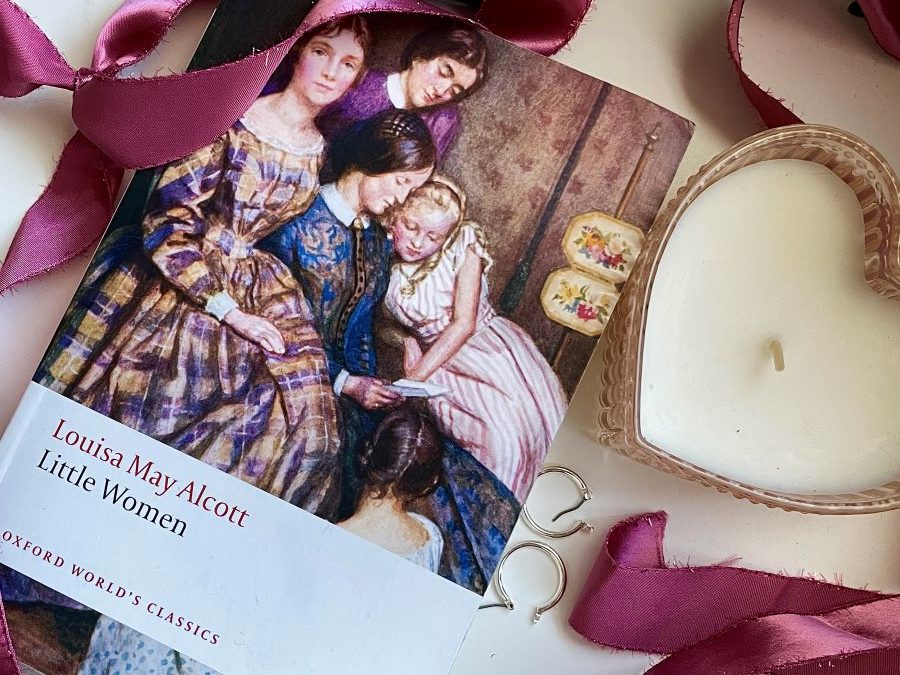Inspiring Girlhood: How the March Sisters display ideal femininity (Editorial)
WRITING AND RIBBONS: Jenna’s personal copy of “Little Women” lays adorned with some of her stereotypically feminine belongings.
March 3, 2023
Growing up as a girl is difficult, especially with a plethora of societal pressures regarding what it means to be feminine. Greta Gerwig’s 2019 adaptation of Louisa May Alcott’s novel Little Women changed that for me and many other girls around the world by offering us a whole family of female role models.
The March Sisters are an ideal example of femininity and womanhood, not in the traditional ‘pearls and gown’ sense but in that they are female role models that many young girls lack. Jo’s unbridled ambition, Beth’s unconditional kindness, Meg’s dedication to her family, and Amy’s desire for what’s right are all ideals I have internalized since my first viewing. Little Women has filled that gap and exemplified what I should and would be as a girl. Obviously, this story is not the only popular culture responsible for some of my personality, but I would say it claims most of it.
Living in a patriarchal society, young feminine people are constantly scrutinized for every little action or decision they make. Stories like Little Women connect girls and women to each other in a way that other forms of media can’t. The vulnerability displayed by the March Sisters is something to be admired and to strive for. Their relationships with one another are complex and dynamic but filled with love for one another.
Since my first viewing, I have modeled my friendships around those in the film. The girls in the film, no matter what age they are, always recover from any conflict and support one another. Due to their being sisters, their relationships are a little different from friendships between nonfamilial girls, but nonetheless sisterhood exists outside blood.
One of the primary conflicts of the film/novel is the relationships between Jo and her perceived love interest Theodore Lawrence, better known as Laurie or Teddy to the girls. Throughout the story, the audience becomes painfully aware of Teddy’s crush on Jo, while she seemingly remains unbothered. *Spoiler warning, skip to next paragraph.* This comes to a climax in the third act when Teddy finally confesses his feelings to an unwilling Jo. In a predictable turn of events, due to this rejection, Amy, who has always been in love with Teddy, marries him at the same time as Jo realizes she does want to marry him. In most soapy stories of today, this would cause a cataclysmic shift in the relationship between Jo and Amy but rather than becoming a fuming ball of regret, Jo accepts the reality of her situation, that she never actually loved Teddy romantically and that she was just choosing the easy option for a woman of her time. Jo doesn’t become upset with Amy but rather supports their marriage, much to Amy’s relief. To this day, the moment that Amy confronts Jo about her marriage acts as a constant reminder of how I should be. I should be accepting of the choices of the people I love and think critically about situations before acting emotionally. The strength that Jo displays in this storyline is one that most people do not possess and I have since striven to due to that.
not only strive to achieve the level of trust and kindness that these girls possess with one another, but take inspiration from their mother as well. While “Marmee” doesn’t play a major role in the film, she does have a few special moments. Vicariously, through the eyes of the March Sisters, I had a wise, kind, and empathetic motherly figure to provide guidance.
In an ideal world, I would absorb all of the positive traits of the girls and become the epitome of femininity but this is unfortunately impossible. Thankfully, there are two films and an incredible novel that I, and many others, can be inspired by and not only use as entertainment but as a goal of how to be. While the March family is not perfect, every deficit in one girl is made up for in another, culminating in a near perfect example of womanhood.
Disclaimer: Articles designated as “Editorial” represent the views and opinions of the author, not the 2022-2023 Periscope staff, CHS/CASD administration, or the CHS student body.































































































Megan Britcher • Mar 9, 2023 at 1:02 pm
I feel the same exact way about this book! Jo has inspired me since I was a little girl to write and pursue English , as well as teach me that (despite what everyone else said) I did not need a boy to make me happy.